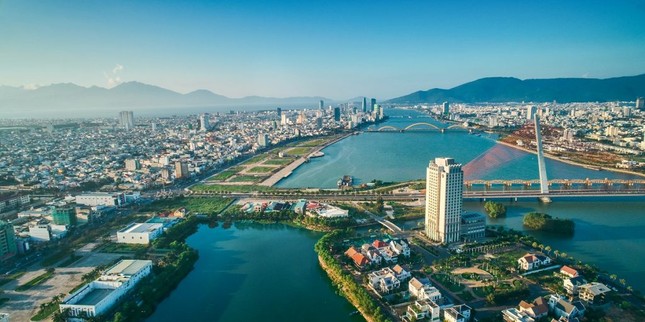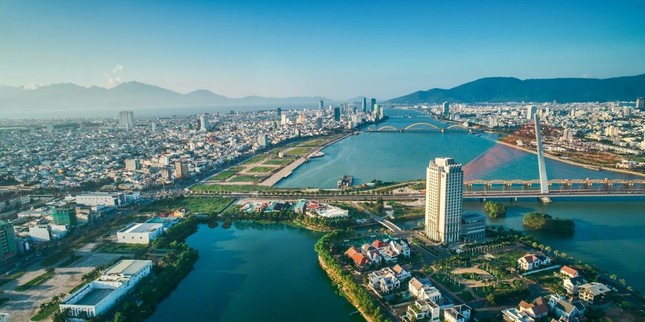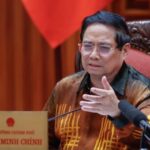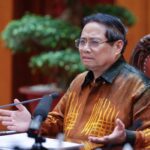
The Vietnamese government has allocated land for the development of an international financial center in Danang. Source: baochinhphu.vn
The policy has two sides: benefits and drawbacks. On the positive side, it attracts foreign investment, fosters the domestic capital market, and encourages innovation. However, it also carries risks, such as investors withdrawing their funds en masse and abruptly in response to any economic incidents in Vietnam. In such a scenario, we need to address the question of how to manage these risks to prevent a collapse, as has happened in several South American countries, South Korea, and Thailand during 1997-1998.
The second issue pertains to the Vietnamese Dong. The Dong is relatively weak, and converting it into other currencies is challenging. This is because it depends on the strength of the economy, political stability, the financial market, the value of the currency, and the ease of trading the currency, especially across borders. This is a significant hurdle. To enhance the convertibility of the Dong, we need to focus on the legal environment, economic strength, and stability.
The third issue relates to the current mode of financial transactions. Mostly, we rely on electronic platforms for our transactions. If we aim to construct a skyscraper in Ho Chi Minh City or Danang to attract financial and auxiliary organizations, it may not align with current trends and could lead to unnecessary waste. Instead, we should prioritize investing in digital infrastructure, including data and information technology, and enhancing the legal framework to facilitate more efficient financial transactions for Vietnam and international partners. This approach is far more beneficial than constructing a skyscraper that may have few occupants.
According to Mr. Luc, the government and ministries have already surveyed international financial market models in various countries. However, we should be mindful that the narrative around international financial centers is a decade old. Today, the landscape and trends have evolved. Twenty years ago, financial transactions were predominantly conducted in centralized physical locations. In contrast, the digital age has shifted the majority of financial transactions to electronic and digital platforms. Vietnam needs to create an environment that facilitates low-cost, safe, and efficient transactions rather than constructing skyscrapers and inviting investors, who may not come due to cost-cutting measures and their preference for digital alternatives.
Regarding the development of a fully digital bank model and fintech testing mechanisms, a nationwide approach should be considered instead of limiting it to specific localities. While pilot projects can be initiated in cities like Ho Chi Minh and Danang, it need not be exclusive to these two locations.
“Concerning digital assets, we only need a legal framework and licenses for the systematic operation of digital platforms. It is essential to orient research and receive mainstream digital currencies issued by central banks. However, we should not encourage privately issued digital currencies like Bitcoin and should instead warn citizens and investors about the risks associated with such investments,” stated Mr. Luc.
Digital Transformation in Banking: Prime Minister Calls for “5 Accelerated, Breakthrough” Strategies
“The banking sector must ‘accelerate and break through’ to achieve its digital transformation goals ahead of schedule. This was the clear message delivered by Prime Minister Pham Minh Chinh at the ‘Banking Industry Digital Transformation Day 2025’ event, organized by the State Bank of Vietnam in Hanoi on May 29th. Emphasizing the industry’s pivotal role in building the nation’s digital economy, the Prime Minister urged swift and decisive action for the banking sector to lead the way.”
The Digital Revolution: Vietnam and France Strengthen Ties Amidst a Landscape of Technological Challenges
At the French Tech Summit Vietnam 2025, the Vietnam Blockchain Association (VBA) emphasized the critical need for transparency, risk management, and trust-building within the digital finance ecosystem. To combat the surge in crypto-asset fraud, the association is piloting anti-fraud tracing initiatives and cross-border payment solutions.
The King of Fruits: Unveiling the Truth Behind Ninh Hiệp Market’s Fake Goods Frenzy
The International Finance Center has achieved success, and there’s been much buzz around it; meanwhile, delegates expressed concern over the open sale of counterfeit and knock-off goods at Ninh Hiep Market. Over 10,400 employees of the Ministry of Finance took early retirement, and a shocking discovery of contaminated durians with banned substances was made. Additionally, a proposal for minimum wage adjustments post-provincial mergers has sparked interest. These are the notable highlights from the past week, capturing the attention of many.
“Prime Minister: Developing a Digital Currency Strategy Tailored to Vietnam’s Needs”
“The development of an international financial center is key to unlocking the country’s growth potential, according to the Head of Government. By establishing a robust financial hub, we can attract global investment, foster innovation, and create a thriving economy that benefits all.”





















